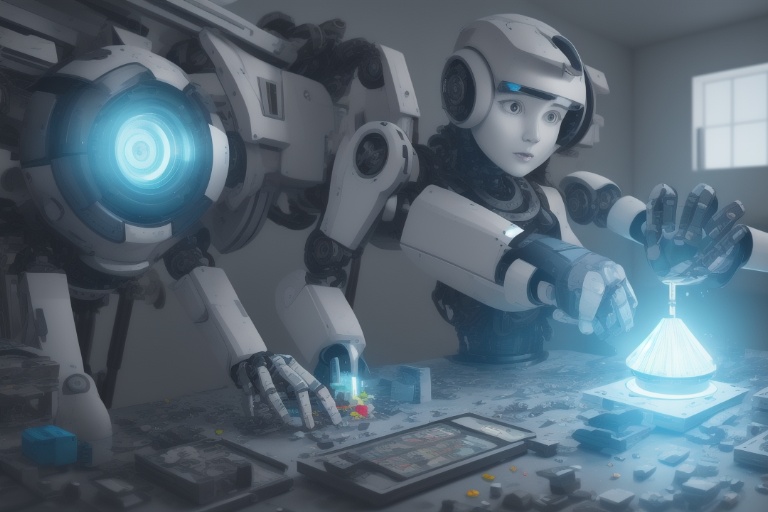Artificial Intelligence (AI) has been taking giant strides, reshaping the technological landscape and altering the way we experience the world. One of the most noteworthy developments in this domain is AI's ability to replicate human voices with astonishing precision. This innovation transcends the once typical robotic intonations of machine-generated speech, and instead, offers voice clones that are strikingly realistic, leading to a revolution in fields ranging from entertainment to communication. But, as with any groundbreaking technological advancement, this capability raises critical ethical questions and presents challenges that demand attention.
Artificial Intelligence (AI) has been taking giant strides, reshaping the technological landscape and altering the way we experience the world. One of the most noteworthy developments in this domain is AI's ability to replicate human voices with astonishing precision. This innovation transcends the once typical robotic intonations of machine-generated speech, and instead, offers voice clones that are strikingly realistic, leading to a revolution in fields ranging from entertainment to communication. But, as with any groundbreaking technological advancement, this capability raises critical ethical questions and presents challenges that demand attention.
The Rise of Vocal Imitation in AI
The evolution of AI voice synthesis technology has been rapid and impressive. Innovators and developers have pushed the boundaries of what was once thought possible, enabling the creation of voice clones that bear an uncanny resemblance to their human counterparts. This is not just an exciting development but could signal a shift in various industries that rely heavily on unique human voices.
Take, for instance, the case of the radio industry. Popular figures, like Robert Smith, who have a distinctive voice that resonates with audiences, could one day find that their unique voices are no longer solely their own. The potential is there for easing the verbal workloads of professionals and personalizing user experiences in new and novel ways. However, the question persists as to whether this technology might ultimately replace the very jobs it seeks to enhance.
Transformative Implications for Industries
As voice cloning technology perfects mimicking human uniqueness, we are witnessing a transformation across numerous sectors. Celebrities like the singer Grimes have pioneered using their digitally replicated voices in ways that mark the dawn of 'voice capitalism.' This paradigm shift stands to redefine the economics of the music industry and entertainment at large.
Such advancements are poised to streamline workflows, open up new avenues in personalized marketing, and broaden the scope of what's possible in customer service. The implications for language translation, audio book narration, and even educational tools are immense. However, the exhilarating potential of this technology walks hand-in-hand with the sobering reality that it may also lead to significant job disruption.
Ethical and Regulatory Considerations
As voice imitation technology rapidly becomes part of the mainstream, its ethical use and regulation become critically important. The potential for misuse is a significant concern, as the ability to create convincing fake audio could lead to instances of fraud and disinformation. This reality compels us to consider how we might ensure that this powerful tool is governed by an ethical framework and overseen with adequate regulatory measures.
Policy-making will play a cornerstone role in shaping the future use of AI voice cloning. Legislators and industry leaders will have to navigate the delicate balance of fostering innovation while protecting individuals and society from the inherent risks that come with such a disruptively potent technology.
Job Roles in Transition
While some view AI voice imitation as a boon that will generate new job roles and opportunities, others are apprehensive about the threat it poses to existing jobs. Voice actors, broadcasters, and other vocations reliant on vocal uniqueness face uncertainty in the face of AI that can mimic any accent, intonation, and emotion.
The conversation surrounding job loss isn't only about the immediate positions at risk but extends to the broader implications for the workforce. There will be a need for jobs focusing on teaching AI systems, ethical oversight, and novel creatives who can leverage this technology in compelling ways. But will these emerging roles be sufficient to outweigh the jobs disrupted?
The Road Ahead
As AI continues to redefine what's possible with voice imitation, we find ourselves at a crossroads where excitement for the future intersects with the imperative to act responsibly. The key will be in how we navigate the duality of advancement and ethics so that the tools we create serve to enhance, not undermine, the societal fabric.
The voice-cloning journey personifies the larger narrative of AI's role in our lives. It merges the realms of technology, creativity, and policy, challenging us to harness AI's potential responsibly. Our course of action will determine the extent to which AI voice technology can serve us, improving interactions and experiences across various industries, without compromising the values we hold dear.
In the era of AI-driven vocal imitation, we are not just passive spectators but active participants in shaping the future. As such, the unfolding techno-drama promises to redefine our auditory experiences and, possibly, the very nature of certain work. The echoes of AI's voice cloning capability will undoubtedly be heard for generations to come. It is upon us to direct this echo towards a harmonious future that cherishes humanity's uniqueness while embracing technological advancement.
Information for this article was gathered from the following source.




